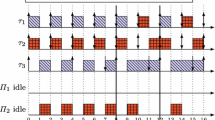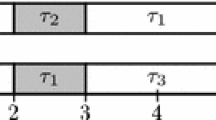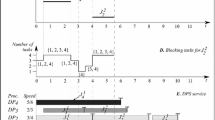Abstract
A heterogeneous system or distributed system typically contains different types of processors. Some jobs can execute on certain types of processors but not other types. Processors of different types may have different speeds. We present several worst-case upper bounds and efficient algorithms for determining the completion times of independent jobs that have arbitrary timing constraints and variable execution times and are scheduled on available processors dynamically in a priority-driven manner. Bounds and algorithms take into account the effects of nonmigratability, nonpreemptability and different levels of migratability.
Similar content being viewed by others
References
C. L. Liu and J.W. Layland, “Scheduling algorithms for multiprogramming in a hard-real-time environment.” Journal of the Association for Computing Machinery20, pp. 46–61, January 1973.
B. Sprunt, L. Sha, and J. P. Lehoczky, “Aperiodic task scheduling for hard-real-time systems.” The Journal of Real-Time Systems, pp. 27–60, 1989.
J. P. Lehoczky, L. Sha, and Y. Ding, “The rate monotone scheduling algorithm: Exact characterization and average case behavior,” in Proceedings of IEEE 10th Real-Time Systems Symposium, December 1989, pp. 166–171.
J. P. Lehoczky, “Fixed priority scheduling of periodic task sets with arbitrary deadlines,” in Proceedings of IEEE 11th Real-Time Systems Symposium, December 1990, pp. 201–209.
N. Audsley, A. Burns, K. Tindell, M. Richrdson, and A. Wellings, “Applying new scheduling theory to static priority pre-emptive scheduling.” Software Engineering Journal8, pp. 284–292, 1993.
M. G. Harbour, M. H. Klein, and J. P. Lehoczky, “Timing analysis for fixed-priority scheduling of hard real-time systems.” IEEE Transactions on Software Engineering20, pp. 13–28, 1994.
J. Sun and J. W. S. Liu, “Bounding completion times of jobs with arbitrary release times and variable execution times,” in Proceedings of IEEE 17th Real-Time Systems Symposium, December 1996, pp. 2–12.
J. W. S. Liu and R. Ha, “Methods for validating real-time constraints.” Journal of Systems and Software30, pp. 85–98, August 1995.
J. Blazewicz, “Selected topics in scheduling theory.” Annals of Discrete Mathematics31, pp. 1–60, 1987.
E. L. Lawler, J. K. Lenstra, A. H. G. Rinnooy Kan, and D. B. Shmoys, “Sequencing and scheduling: Algorithms and complexity,” Technical Report BS-R8909, Center for Mathematics and Computer Science, Department of Operations Research, Statistics and System Theory, June 1989.
E. Horowitz and S. Sahni, “Exact and approximate algorithms for scheduling non-identical processors.” Journal of ACM23, pp. 317–327, 1976.
R. Ha, “Validating timing constraints in multiprocessor and distributed systems,” Technical Report UIUCDCS-R-95-1507, University of Illinois at Urbana-Champaign, Department of Computer Science, University of Illinois, 1995.
T. Nakajima, T. Kitayama, H. Arakawa, and H. Tokuda, “Integrated management of priority inversion in real-time mach,” in Proceedings of IEEE 14th Real-Time Systems Symposium, December 1993, pp. 120–130.
Author information
Authors and Affiliations
Rights and permissions
About this article
Cite this article
Ha, R., Cha, H. & Liu, J.W.S. Validating Real-Time Constraints in Heterogeneous Multiprocessor and Distributed Systems. Journal of Systems Integration 9, 207–222 (1999). https://doi.org/10.1023/A:1026436324575
Issue Date:
DOI: https://doi.org/10.1023/A:1026436324575




